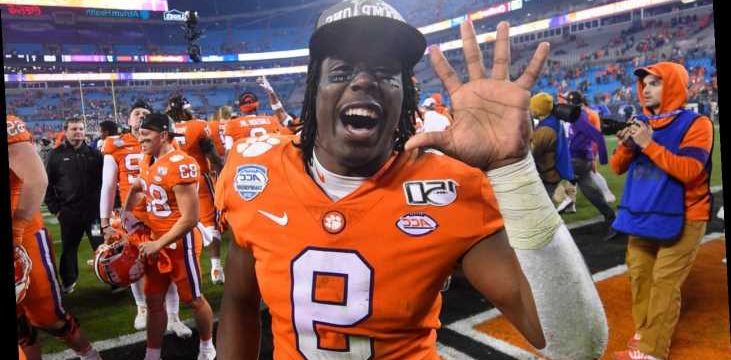One of the most surprising stay-or-go decisions by any underclassman in recent memory came down Friday, when running back Travis Etienne announced that he would return to Clemson for his senior year and bypass an opportunity to enter the NFL Draft.
Etienne, who has arguably been college football’s most effective running back on a per-touch basis over the past two years, was widely considered a lock to leave early. Though Etienne wasn’t necessarily slated to be a first-round pick, ESPN draft analyst Mel Kiper had rated him No. 4 among running backs, which would have potentially put him in the second or third round.
“I have long dreamed of competing at the highest level and getting a chance to compete in the NFL,” Etienne wrote in a message posted to Twitter. “But I’m not done dreaming here at Clemson either.”
Running back Travis Etienne has averaged 7.96 yards per carry over the past two years at Clemson. (Photo: Bob Donnan, USA TODAY Sports)
Among the elite programs, Clemson has arguably more good fortune than anyone in getting draft-eligible players to return. The most notable instance came after the 2017 season when defensive linemen Christian Wilkins and Clelin Ferrell came back as seniors, led the Tigers to a second national championship and both ended up as top-15 draft picks.
Let’s hope it works out just as well for Etienne, whose return all but cements Clemson’s case to be the preseason No. 1-ranked team in 2020.
While it’s unfair to criticize any decision a player makes about their future, whether that’s completing their college eligibility or deciding at any point that it's time to go make money playing sports, the Etienne decision is definitely more puzzling than most. There are lots of reasons for that.
LSU VISIT: President Trump shares thoughts on impeachment, uses profanity during football celebration at White House
First and foremost, he plays a position where the prime career window is often short and the physical demands are great — particularly for the style of runner Etienne is that can absorb lots of contact and stay on his feet. Injury is a risk with any player, but running backs are often perceived to have more to lose if their medical history is problematic.
Second, Etienne doesn’t have a ton to prove at the college level anymore having already won a national title and averaging 7.96 yards per carry over the past two years. Is it possible another year of elite-level work will boost him into the first round? Sure, but at the same time, it's hard to imagine his raw numbers improving much since his relatively light workload of 13.8 carries per game is often the product of Clemson getting big leads and resting its starters. That’s not going to change next year.
Third, even if Etienne got picked in the second or third round, he’d be eligible for free agency after four years instead of five, which is a pretty big advantage if he hit it big as an NFL player. Now, all of that is delayed by a year, not to mention uncertainty about how the NFL’s next collective bargaining agreement is going to treat rookie contracts after the current one expires next season.
But Etienne isn't alone among running backs this year in turning down an opportunity to be drafted. Alabama’s Najee Harris and Oklahoma State’s Chuba Hubbard are also coming back to school.
At the end of the day, Etienne should do whatever is best for him and for his future. If that is playing another year of college football, so be it. Let's hope he’s gotten the right advice, though, because from a business standpoint coming back to school doesn’t seem worth the risk.
Source: Read Full Article
